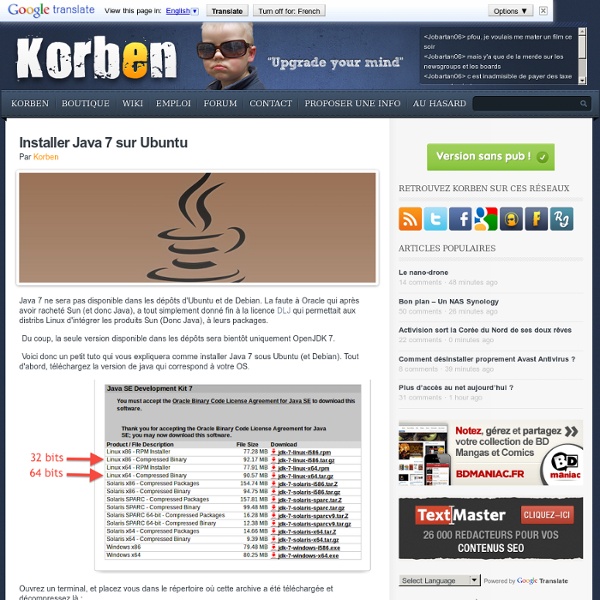Installer Java 7 sur Ubuntu

Connaître le parc informatique avant de l'organiser | Landpark
Etape 2: connaître votre parc informatique et d'équipements avant de l'organiser Il vous faut connaître le parc informatique avant de l'organiser : certaines règles et pratiques à travers notre expérience peuvent servir d'exemples et vous aider dans une stratégie déterminée en fonction des besoins de votre entreprise. Évaluer précisément les coûts : savoir exactement combien coûte chaque poste budgétaire, le coût de renouvellement du matériel, le budget logiciels et la sous-traitance. Réaliser un inventaire précis du parc informatique: l'inventaire nécessite souvent des heures de travail; l'automatiser permet un gain de temps considérable. Réaliser un inventaire précis (configurations, matériels, logiciels installés, etc.) et des équipements du réseau avec un logiciel d'inventaire automatisé tel que Landpark Inventory est indispensable. Vérifier l'ensemble de vos contrats de licences : dans votre budget, la ligne "licences logiciels" devient de plus en plus importante.
Cours d'Algorithmique - Christophe Darmangeat -
PARTIE 9 Enoncé des Exercices Exercice 9.1 Parmi ces affectations (considérées indépendamment les unes des autres), lesquelles provoqueront des erreurs, et pourquoi ? Variables A, B, C en Numérique Variable D en Caractère A ← Sin(B) A ← Sin(A + B * C) B ← Sin(A) – Sin(D) C ← Sin(A / B) C ← Cos(Sin(A) Ecrivez un algorithme qui demande un mot à l’utilisateur et qui affiche à l’écran le nombre de lettres de ce mot (c'est vraiment tout bête). Ecrivez un algorithme qui demande une phrase à l’utilisateur et qui affiche à l’écran le nombre de mots de cette phrase. Ecrivez un algorithme qui demande une phrase à l’utilisateur et qui affiche à l’écran le nombre de voyelles contenues dans cette phrase. On pourra écrire deux solutions. Ecrivez un algorithme qui demande une phrase à l’utilisateur. Exercice 9.6 - Cryptographie 1 Un des plus anciens systèmes de cryptographie (aisément déchiffrable) consiste à décaler les lettres d’un message pour le rendre illisible. Exercice 9.8 - Cryptographie 3
Related:
Related:



